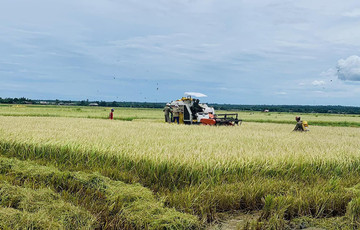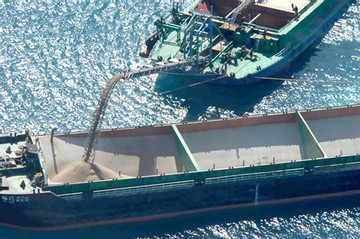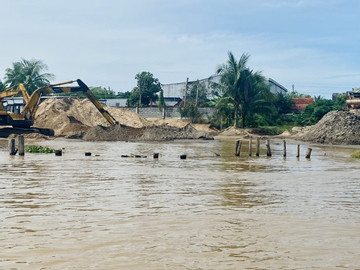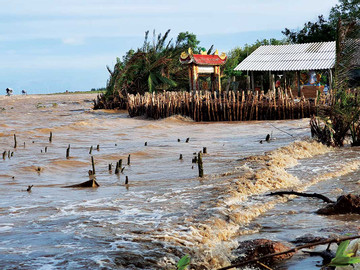- © Copyright of Vietnamnet Global.
- Tel: 024 3772 7988 Fax: (024) 37722734
- Email: evnn@vietnamnet.vn
Mekong Delta
Update news Mekong Delta
Measures for education advancement in Mekong Delta
The Mekong Delta region is seeking to improve education quality and infrastructure for students, especially at a high level, to create skilled labour forces.
Investment of $304.3 million proposed to upgrade Mekong Delta roads
The Ministry of Transport propose projects to upgrade and improve three national highways, 53, 62 and 91B, in Mekong Delta provinces.
Mekong Delta province’s rice output tops 10 million rice tons
Farmers in Vietnam's southern tip, Ca Mau Province, harvested more than 1.5 million hectares of winter-spring rice crop; thus, the province’s rice output topped over 10 million rice tons.
Vietnam sees farming revolution, exports high-quality rice
Anticipating that rice yield and output are nearly hitting the ceiling, Vietnam is preparing for a revolution in rice farming, striving for 1 million hectares of high-quality rice.
Mekong Delta needs $4b to improve infrastructure to mitigate climate change
The Mekong Delta needs more than VNĐ94.3 trillion (nearly US$4 billion) to improve its road infrastructure in order to boost its inter-provincial connectivity while mitigating the impacts of climate change.
Mekong Delta to carry out 16 climate change response projects
Sixteen projects worth over 94 trillion VND (4 billion USD) are planned to be implemented in the Mekong Delta to help the region respond to climate change.
Landslides in Mekong Delta increasingly serious
Landslides in many localities in the Mekong Delta have been increasingly serious in recent years, occuring all year round.
VN central bank calls for prioritising loans for rice industry
The State Bank of Vietnam (SBV) has instructed credit institutions in the Mekong Delta region to promote lending to rice producers and traders to help them have sufficient capital, especially in the winter-spring harvest in 2023.
Mekong Delta develops trademarks for specialties
Building and developing trademarks and obtaining certificates of origin are considered effective ways to create added value for products, thus expanding markets for specialties of the Mekong Delta.
The vanishing catch: How women are suffering in the Mekong Delta
As climate change, upstream hydropower dams and intensive agriculture threaten traditional farming and fisheries in the Mekong Delta, women like Nga are struggling to find stable alternative livelihoods.
Huge transport projects to be built in Mekong Delta
By 2026, the Mekong Delta is expected to have about 554km of highways, which will help promote the region's socio-economic development.
Builders eye sea sand for construction as river sand runs out
The General Department of Geological and Minerals of Vietnam is urgently carrying out work related to assessing sea sand exploitation for levelling highways, transport and urban infrastructure projects in the Mekong Delta.
Mekong Delta seeking feasible measures for sustainable sand exploitation
The sand demand in the Mekong Delta is quite high, especially with the North-South Expressway project going on. Yet, the sand volume here is remarkably decreasing, leading to an urgent need for feasible proposals on sand exploitation.
Mekong Delta region in need of railway line
According to historical documents the 70 km long Saigon-My Tho railway line was the first railway line in Vietnam in the once Indochina region which began operations on 20 July 1885.
Mekong Delta develops more OCOP products
The Cuu Long (Mekong) Delta’s 12 provinces and the city of Can Tho are developing more products under the country’s “One Commune-One Product” programme.
Expressway network expected to create breakthroughs in Mekong Delta
A lot of expressway projects have been implemented and are about to start construction, creating a big opportunity for the Mekong Delta to vigorously develop.
Mekong Delta provinces to focus on community-based tourism in 2023
Mekong Delta provinces plan to focus on community-based tourism projects in 2023 to boost tourism development and lure more visitors.
Landslides worsen in Mekong Delta
Landslides are getting worse in the Mekong Delta in both scale and frequency. What do we need to do to minimize the negative impacts of landslides in the region?
Transport Ministry urges new ship channel for large vessels in Mekong Delta
The Ministry of Transport has urged Tra Vinh Province to implement compensation payment for site clearance and resettlement support to build a new ship channel for large vessels in the Hau River.
Breeding snakes in cement tanks yields high profits for farmer
Breeding 1,500 breeding ri voi snakes (Subsessor bocourti), a farmer in Tien Giang province now earns nearly US$30,000 a year.



















